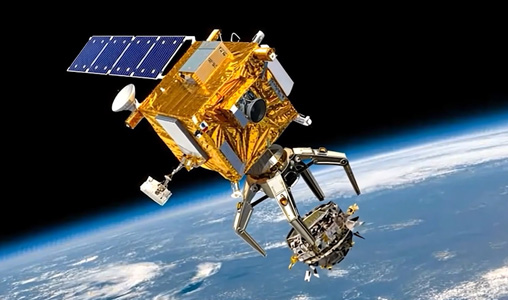Space Logistics: strategic leverage for sustainable development
Space Logistics represents an emerging and strategic frontier in the global economic and technological landscape, with significant implications for companies and investors interested in seizing innovation and sustainable growth opportunities. According to the report by the Intesa Sanpaolo Innovation Center dedicated to Space Logistics, the evolution of this market is driven by technological innovation and growing demand for advanced services in orbit. This sector includes all operations related to the maintenance, transport, refuelling and management of space resources, ensuring continuous and efficient operations for satellites, orbital stations and other infrastructure.
GROWTH OF THE SPACE LOGISTICS MARKET AND GLOBAL OUTLOOK
The Space Logistics market shows a robust growth trajectory, valued at $5.32 billion in 2023, estimated to increase to around $17 billion in 2030, with a compound annual growth rate (CAGR) of 18.3%1. This growth is driven by factors such as the increase in commercial space missions, the proliferation of satellites, and the growing demand for advanced space data and communications.
TECHNOLOGICAL INNOVATION AND ENVIRONMENTAL SUSTAINABILITY IN SPACE ACTIVITIES
Sustainable solutions in the environmental management of space activities are of strategic importance, which was also highlighted in the Space Logistics report2, developed by Intesa Sanpaolo Innovation Center together with the LINKS Foundation and Thales Alenia Space Italia.
With a record of 253 orbital launches in 2024 alone, the urgency of limiting the environmental impact of these activities becomes increasingly relevant. To meet this challenge, research and innovation are focusing on sustainable technologies such as biomethane and bio-kerosene, low-impact propellants, and the development of reusable launchers. In addition, there is a growing focus on the responsible management of space debris, which constitutes a real threat to the safety of orbital operations and long-term sustainability.
In relation to these topics, the development of solutions – including domestically driven ones – for the adoption of electric propulsion systems in satellites is worth noting. This technology, thanks to its high controllability, facilitates orbital positioning and repositioning, while also helping to prevent collisions and reduce space debris.
SPACEPORTS: NEW INFRASTRUCTURE FOR SPACE COMPETITIVENESS
The expansion of Space Logistics is also realised by creating advanced ground infrastructure. In Europe, several countries are making significant investments in new spaceports and launch sites. An emblematic example is the spaceport project in Grottaglie, Puglia region, specialising in suborbital missions, as well as similar infrastructure under construction in Germany, Norway and Great Britain. These new facilities not only ease access to space, but also offer integrated logistics, maintenance, assembly and reconditioning services, thus creating a competitive and attractive ecosystem for domestic and international investments and cooperation. The operational efficiency deriving from this infrastructure is destined to further consolidate Europe's strategic position in the global space market.
DIGITAL INTEGRATION AND CYBERSECURITY IN SPACE
This sector also sees a strong integration with advanced digital technologies, both on Earth and in orbit. Control infrastructure accessible on a pay-per-use basis, according to the Ground Segment-as-a-Service model, plays a crucial role in the management and transmission of spatial data, enabling access to space for large numbers of highly innovative but undercapitalised players. Innovations such as space-space and Earth-space communications based on optical links guarantee high transmission capabilities, greater security and resilience to interference. Running in parallel, cybersecurity becomes a fundamental aspect to protect space assets from potential cyber threats and natural interference such as solar storms, thus posing new challenges but also new opportunities for the development of innovative solutions in the field of space security.
IN-ORBIT SERVICING: NEW BUSINESS OPPORTUNITIES
In-Orbit Servicing represents a breakthrough in the space sector, allowing maintenance and upgrades directly in orbit, with advantages in terms of satellite durability and debris reduction. In the next years, orbital assembly and maintenance centres will become operational, capable of complex and automated operations, allowing new business models to develop and improving the efficiency and sustainability of space infrastructure.

GLOBAL OPPORTUNITIES FOR SPACE LOGISTICS IN THE NEW SPACE ECONOMY
In conclusion, Space Logistics represents a key element in addressing global challenges, strengthening the resilience of space and ground systems, and supporting sustainable and permanent development. Companies that seize these opportunities will be able to position themselves strategically in the emerging market of the New Space Economy, contributing decisively to innovation and global progress.
The IMI Corporate & Investment Banking Division of Intesa Sanpaolo partners with several international players in the space and satellite sector, supporting them in their investments and working capital requirements along the entire value chain.
To learn more about Space Logistics and other insights dedicated to frontier innovation, visit the Intesa Sanpaolo Innovation Centre website
1 Maximize Market Research
2 It is possible to explore in greater depth the strategic role of space
logistics in the development of the New Space Economy through the X-Plore Space Logistics report, produced by Intesa Sanpaolo Innovation Center, the
Intesa Sanpaolo Group company dedicated to frontier innovation.